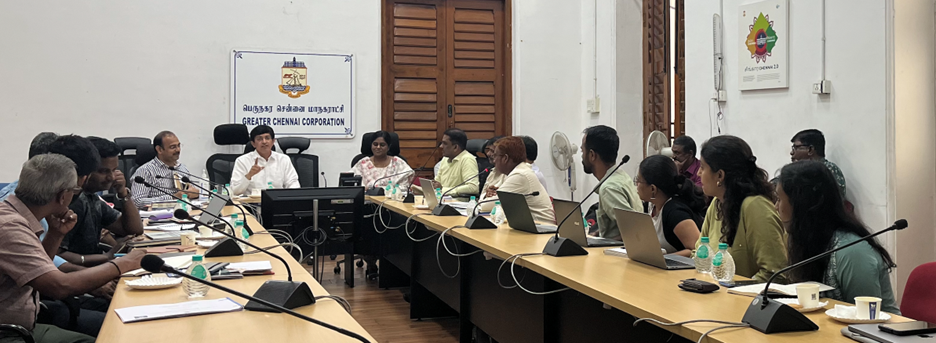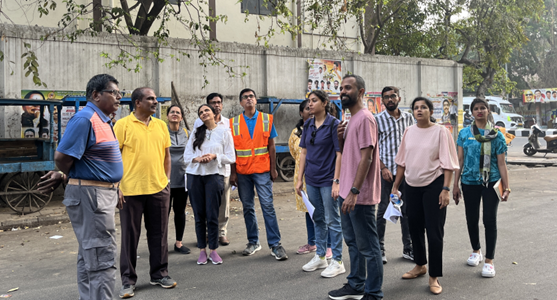India Sustainable Mobility Initiative
April-June | 2025Bilateral
Mitigation of Climate Change
Link To Project: Click Here
With a focus on inclusive and sustainable mobility, ITDP India is working with city and state agencies to implement evidence-based street reforms, reimagine public transport options, and prioritise safer access for children and pedestrians.
Project Updates
This edition highlights the Institute for Transportation and Development Policy (ITDP) India’s role in advancing people-first mobility in Chennai and Nagpur. In Chennai, ITDP supported the Anna Nagar parking plan, led Safe Routes to School engagement and design, and conducted a survey on premium bus demand. In Nagpur, ITDP partnered with the city to assess walking and cycling infrastructure, guiding data-driven improvements for safer, more inclusive streets.
Chennai Scales Parking Reforms with Data
Following the successful adoption of the Chennai Metropolitan Area Parking Policy, developed by Chennai Unified Metropolitan Transport Authority (CUMTA), with technical input from ITDP India, the pilot Area Level Plan (ALP) for Anna Nagar was officially approved by Greater Chennai Corporation. The ALP outlines a detailed parking management and enforcement strategy for the neighbourhood and was presented at a public stakeholder meeting hosted by CUMTA and ITDP India, where it received strong support from local residents and businesses. This pilot marks a critical shift toward integrated and equitable use of public space and sets a precedent for citywide, scalable parking reform. It contributes to SDG 11.2 by improving access to sustainable transport systems.
Read more about the parking policy and its impact here.
Elevating Children’s Voices in Urban Safety
As part of the Safe Routes to School (SRTS) initiative, ITDP India launched Love Letter to My School Street online campaign to understand how children experience their daily commute. More than 80 students from Chennai and beyond responded with thoughtful requests for safer, cleaner, and well-shaded streets, placing the spotlight on the needs of vulnerable road users. This engagement directly contributes to SDG 11.7 (universal access to safe public spaces) and SDG 3.6 (reducing road traffic injuries).
Building on this momentum, ITDP India has been conducting in-depth school engagement and consultations to incorporate children’s voices into street design. In collaboration with the Greater Chennai Corporation (GCC), it was decided that the KK Nagar scale-up of the SRTS initiative will be taken up as part of the ₹200 crore allocation for 200 km of footpaths under the state budget. Of this, 19.5 km is now earmarked specifically for child-friendly streets, a major milestone in securing dedicated funding for school zone safety. These streets will go beyond standard footpath improvements to include stakeholder consultations, traffic assessments, and detailed design drawings, setting a new benchmark for inclusive, context-sensitive design in Indian cities.
Chennai Perception of Premium Bus Service
To reduce private vehicle dependence and increase public transport ridership, ITDP India conducted a perception survey of 471 private vehicle users in Chennai. The results show significant appetite for mode shift: 78% of respondents said they would switch to premium bus services, particularly current cab users. Demand is especially high among IT corridor commuters, where 88% expressed interest in shifting to high-quality bus services.
Respondents were willing to pay ₹4–₹8 per km, with an average fare of ₹75 for a 12 km ride. These insights provide a compelling case for cities to pilot premium services on routes like Anna Nagar to Siruseri, backed by targeted fare strategies, app-based ticketing, and integration with existing public transport systems. The findings support Nationally Determined Contributions (NDCs) and SDG 11.2 by advancing low-emission, inclusive transport options, and inform city-led innovations to modernize bus operations and win back commuters. Read the full report to explore more on what commuters' value most, and what cities can do to design services that attract them.
Nagpur Advances Safe, Inclusive Streets with Evidence-based Assessment
In collaboration with ITDP India, the Nagpur Municipal Corporation has developed the Nagpur Urban Streets Assessment Report: a foundational step toward enhancing non-motorised transport infrastructure in the city. The report evaluates walking and cycling conditions on seven key streets using a three-pronged methodology: perception surveys to capture user experiences, observation surveys to assess actual use and behaviour, and design surveys to evaluate physical infrastructure.
By identifying what’s working, what isn’t, and where interventions are most needed, the report offers street-specific insights to guide data-driven, people-centric improvements. This initiative contributes to SDG 11 by promoting safe, accessible, and inclusive urban public spaces. It also reflects Nagpur’s growing commitment to sustainable urban mobility.
Copyright © 2025 All rights reserved






